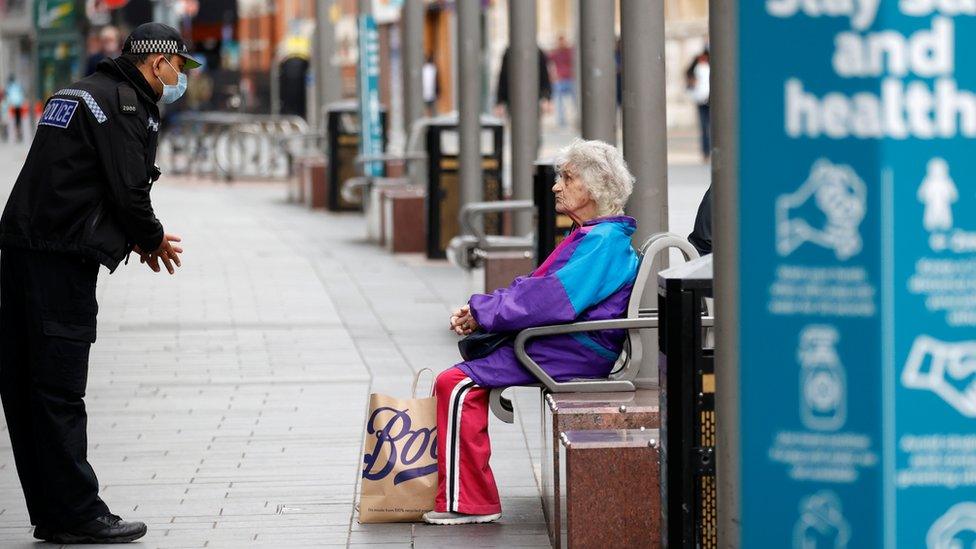Local lockdowns: Misleading claims circulate online
- Published

As Leicester becomes the first city to be subject to a local lockdown, misleading claims are being shared across social media.
A number of local councils have come out on Twitter and Facebook to counter online rumours of imminent lockdowns in their areas - making it clear none have been announced.
A rise in cases has been recorded in some local authority areas but a Public Health England (PHE) spokesperson told the BBC: "To use this data in isolation to predict which areas will see significant increases in cases is not appropriate as it does not provide a complete picture of what is happening locally."
Experts at PHE are currently looking at outbreaks in much smaller areas, rather than whole towns or cities, to inform decisions about any future local lockdowns.
We've identified posts in Facebook and WhatsApp groups that may have led to some of the rumours.
Local Facebook groups
A number of national and local news outlets have posted lists of local authorities in England experiencing a rise in coronavirus cases. These stories have been shared by residents on local forums and fuelled misleading claims about imminent lockdowns.
One local Facebook group warns: "Oldham is rapidly speeding towards local lockdown" accompanied by a list published in a local paper. Another group in Sheffield says "this is getting serious" expressing fears about a lockdown in the city.
Similar claims and links are being shared in a number of WhatsApp groups in England - including in Stoke, Portsmouth, Sandwell in the West Midlands, the London Borough of Haringey and elsewhere.
However, these lists are based on weekly case increases "without any wider context" according to Professor Kate Ardern from Wigan's Public Health department.
Allow Facebook content?
This article contains content provided by Facebook. We ask for your permission before anything is loaded, as they may be using cookies and other technologies. You may want to read Meta’s Facebook cookie policy, external and privacy policy, external before accepting. To view this content choose ‘accept and continue’.

Her comments were shared on Facebook by Wigan Council, which has had to counter a number of misleading claims circulating in local groups - including one called Coronavirus Concern Wigan, with over 13,000 members.
In the Council's post, Professor Ardern explains that the council has "been made aware that the media is sharing a list of places that could be next" - which features the town in Greater Manchester.
"Last week we only recorded two new cases, compared to zero cases the week before. Our 7-day infection rate is 3.7 per 100,000 people compared to Leicester's rate of 135 per 100,000. We also currently have the sixth lowest rate of cases in Greater Manchester," she adds.
Other councils in Doncaster, Wiltshire and Havering, have shared similar posts countering claims on social media.
Public Health England has said the data featured in these lists cannot be used in isolation to predict where the next localised lockdown will happen.
Bradford Council also had to counter concern online after Health Secretary Matt Hancock claimed that there had been a coronavirus outbreak in the wrong part of Yorkshire.
Yesterday, Mr Hancock mixed up Keighley with Kirklees (where staff at a meat factory have tested positive for Covid-19) - leading Bradford council to take to Twitter to "calm everyone down a bit".
Allow X content?
This article contains content provided by X. We ask for your permission before anything is loaded, as they may be using cookies and other technologies. You may want to read X’s cookie policy, external and privacy policy, external before accepting. To view this content choose ‘accept and continue’.
While local Facebook groups are useful places for community discussion, they can also be a fertile breeding ground for misinformation - especially over local concerns when a lot of people are already feeling worried.
Speculation about the cause
A number of posts attributing the local lockdown in Leicester to videos of crowds of people taking part in anti-racism protests in the city centre a few weeks ago have been shared on Twitter and Facebook. These have led to racist and abusive comments directed at protesters.
One post shared by a Facebook page links to an article featuring images of recent Black Lives Matter protests. It asks: "Are scenes like these in Labour-run Leicester from a couple of weeks ago a contributing factor to why the city is back in lockdown?"
Another post shared on a Facebook group says: "8th of June 4 thousand BLM protesters in Leicester. 20 days later, and now Leicester is on the brink of another lockdown".
A number of factors could have contributed, including gatherings of people in workplaces, schools, homes and outdoors.
Often posts just claim to be "asking questions" or call on others to "be the judge" - while subtly pushing unsubstantiated claims about the complex issue of infection rates.
Misinformation is frequently shared as a way of affirming bias or as a way of criticising political opponents. Always check the source and think about the motive for sharing claims.
Additional reporting by Jack Goodman, Shayan Sardarizadeh and Olga Robinson
Is there a story we should be investigating?Email us, external


